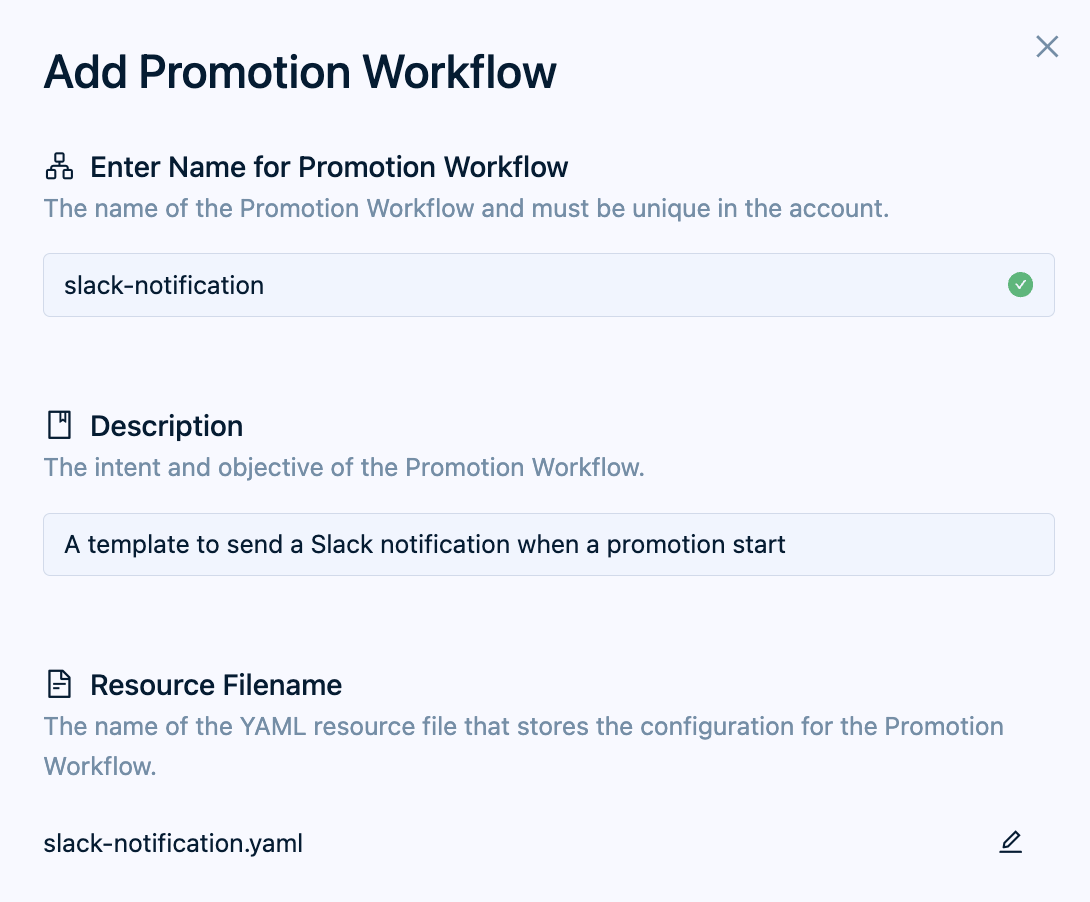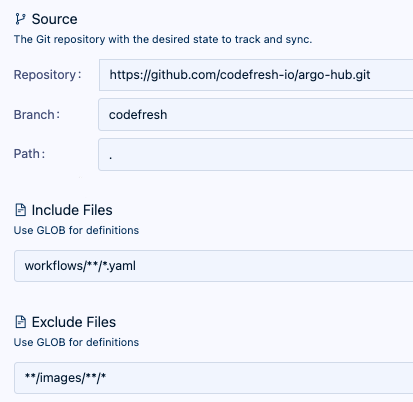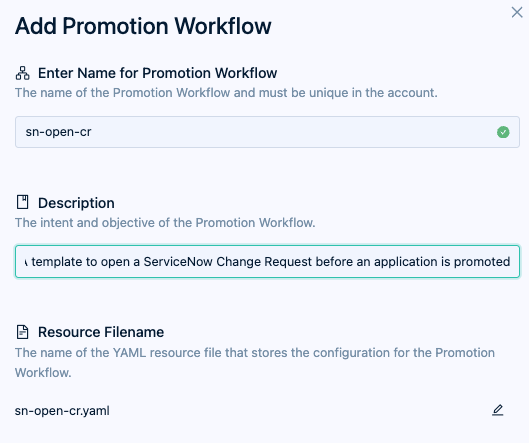Quick start: Creating Promotion Workflows
Create a workflow template to use as pre- or post-action
Promotions is currently in development
This feature is still under active development and we’ve identified some issues with its resilience and reliability, particularly with recovery from cluster and network problems. We are currently upgrading our architecture to resolve these known issues and add self-healing capabilities. We don’t recommend using Promotions for mission-critical or production deployments at this time.
Promotion Workflows quick start
This quick start will guide you through creating a Promotion Workflow in Codefresh.
Promotion Workflows are Argo Workflow Templates that automate tasks such as notifications, validations, and additional deployments before or after a promotion. They can be used in Promotion Flows to automate tasks before or after promotion.
For detailed information, see Configure Promotion Workflows.
This quick start includes examples of two Promotion Workflows:
- Example 1: Promotion Workflow for Slack notifications
- Example 2: Promotion Workflow to open a ServiceNow Change Request
Requirements
- GitOps Runtime
- Git Source to store application manifests
- Products and applications
- Environments
Example 1: Create Promotion Workflow to send Slack notifications
This example creates a Promotion Workflow that sends Slack notifications. The Workflow runs a container from Codefresh’s Argo Hub, which posts a message to Slack.
Creating a Promotion Workflow is as simple as creating an Argo Workflow Template which you can create directly from the UI.
For simplification, we are using a hard coded version of an existing template from our library.
Step-by-step
- In the Codefresh UI, from the sidebar, select Promotion Workflows, and click Add Promotion Workflow.
- Define the following:
- Name: A unique name for the Promotion Workflow,
slack-notificationfor the quick start. - Description: A meaningful description of the Workflow Template’s purpose. For example,
A template to send a Slack notification. - Resource Filename: The name of the manifest file that will be saved in
resources/control-planes/promotion-workflowsfolder in your Shared Configuration Repository. By default, this is identical to the Name of the Workflow. Leave as-is for the quick-start.
- Name: A unique name for the Promotion Workflow,
- Click Add.
- Select Blank Skeleton File as the Workflow Template, and click Next.
- In the YAML editor on the right, replace the
specin line 13 with the following block:
spec:
serviceAccountName: promotion-template
arguments:
parameters:
- name: APP_NAME
entrypoint: slack-promotion
templates:
- name: slack-promotion
container:
name: main
imagePullPolicy: Always
image: quay.io/codefreshplugins/argo-hub-slack-post-to-channel:0.0.2-main
command:
- python
- /slack/slack.py
env:
- name: SLACK_CHANNEL
value: '[email protected]'
- name: SLACK_MESSAGE
value: 'Application `{{ workflow.parameters.APP_NAME }}` has been promoted'
- name: LOG_LEVEL
value: 'info'
- name: SLACK_TOKEN
valueFrom:
secretKeyRef:
name: 'slack-token'
key: token where:
SLACK_MESSAGEis the message to display in the Slack notification. In the example, the message indicates that the application has been promoted.SLACK_CHANNELcan either be the name of a Slack channel or the email of a user.slack-tokenis the name of the secret holding your Slack Token, in thetokenkey.
- Click Commit
- Optional. Feel free to add a Commit Message.
- Click Commit again.
After a few minutes, the new Promotion Workflow is displayed in the Promotion Workflows list.
Example of Slack notification sent with this Promotion Workflow
This is an example of the Slack notification sent before promotion starts in an environment.
Example 2: Open a ServiceNow change request
This example creates a Promotion Workflow that opens a ServiceNow change request. The Promotion Workflow uses the existing ServiceNow Workflow Template from the Codefresh Argo Hub library.
Step 1: Add a Git Source for the Argo Hub library
To use the ServiceNow Workflow Template, first add a Git Source to your GitOps Runtime that points to the Argo Hub library.
See Add a Git Source.
- Configure the Git Source using the settings shown in the example below.
Step 2: Create Promotion Workflow with ServiceNow change request
Create the Promotion Workflow with the ServiceNow change request.
- In the Codefresh UI, from the sidebar, select Promotion Workflows, and click Add Promotion Workflow.
- Define the following:
- Name: A unique name for the Promotion Workflow,
sn-open-crfor the quick start. - Description: A meaningful description of the Workflow Template’s purpose. For example,
A template to open a ServiceNow Change Request before an application is promoted. - Resource Filename: The name of the manifest file that will be saved in
resources/control-planes/promotion-workflowsfolder in your Shared Configuration Repository. By default, this is identical to the Name of the Workflow. Leave as-is for the quick-start.
- Name: A unique name for the Promotion Workflow,
- Click Add.
- For the quick start, select Blank Skeleton File as the Workflow Template, and click Next.
- In the YAML editor on the right, replace the
specin line 15 with the following block:
spec:
serviceAccountName: promotion-template
arguments:
parameters:
- name: APP_NAME
entrypoint: sn-open-cr
templates:
- name: sn-open-cr
outputs:
parameters:
- name: CR_SYSID
valueFrom:
expression: "tasks['create-sn-cr'].outputs.parameters['CR_SYSID']"
dag:
tasks:
- name: create-sn-cr
templateRef:
name: argo-hub.servicenow.1.3.1
template: createcr
arguments:
parameters:
- name: TOKEN
value: cf-api-key-aperture
- name: CF_RUNTIME
value: demo
- name: SN_INSTANCE
value: "https://xxxxxx.service-now.com/"
- name: SN_AUTH
value: "sn-auth"
- name: CR_DATA
value: >-
{"short_description": "{{ workflow.parameters.APP_NAME }} deployment",
"description": "Change for build {{workflow.uid}}.\nThis change was created by the Codefresh GitOps promotion flow",
"justification": "My app is awesome! Please deploy ASAP",
"cmdb_ci":"tomcat", "assignment_group":"a715cd759f2002002920bde8132e7018"
}where:
TOKENis the Codefresh API Key to allow Service Now to reach back to the Codefresh instance.SN_AUTHis the secret holding credentials to connect to the ServiceNow instance (SN_INSTANCE)CR_DATAis the JSON payload to be able to open a Change Request.
- Click Commit
- Optional. Feel free to add a Commit Message.
- Click Commit again.
After a few minutes, the new Promotion Workflow is displayed in the Promotion Workflows list.
Using Promotion Workflows in Promotion Flows
After creating Promotion Workflows, you can add them to any Promotion Flow and automate key actions before or after promoting an environment.
These workflows help enforce policies, validate changes, and trigger external processes as part of the promotion lifecycle.
For example, you can configure the ServiceNow Promotion Workflow in example 2 as a Pre-Action Workflow in a Promotion Flow. The Workflow will then run before the changes are promoted to open a change request.
What’s next
The next quick start will guide you through adding Promotion Workflows to each environment in a Promotion Flow. Promotion Workflows act as gates for conditional promotions, giving you more control and flexibility over promotion processes.
Quick start: Advanced Promotion Flow with Promotion Workflows




